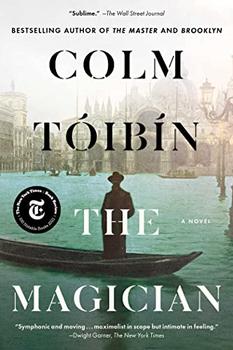Summary | Excerpt | Reading Guide | Reviews | Beyond the Book | Readalikes | Genres & Themes | Author Bio

A Novel
by Colm Toibin
Some in Lübeck took the view that the brothers were, in fact, not merely examples of a decline in their own household but presentiments of a new weakness in the world itself, especially in a northern Germany that had once been proud of its manliness.
Much then depended on their younger brother, Viktor, born when Heinrich was nineteen and Thomas almost fifteen.
"Since the first two boys have grown so attached to poetry," Aunt Elisabeth said, "we can only hope that this new one prefers ledgers and account books."
In the summer, once the family arrived at Travemünde for their four weeks' holiday by the sea, all thought of school and teachers, grammar and ratios and the dreaded gymnastics was banished.
In the beachside hotel, a Swiss-style lodge, Thomas, who was fifteen, woke in a tidy little room with old-fashioned furniture to the sound of the gardener raking the gravel under the bright white sky of a summer morning on the Baltic.
With his mother and Ida Buchwald, her female companion, he had breakfast on the balcony of the dining room or under the tall chestnut tree outside. Beyond them was the short grass, giving way to the taller shore vegetation and then the sandy beach.
His father seemed to take pleasure in the hotel's minor shortcomings. He believed the tablecloths to be too hastily laundered and the tissue-paper napkins to be vulgar; the strange bread and the metal eggcups were not to be tolerated. And then, having listened to him complain, Julia would calmly shrug.
"Everything will be perfect when we go home."
When Lula asked her mother why their father seldom came to the beach with them, she smiled.
"He enjoys being in the hotel, and he doesn't want to come to the beach. So why should we make him?"
Thomas and his siblings would go with his mother and Ida to the beach and curl up on the chairs put in place by the hotel staff. The hum of conversation between the two women would stop only when anyone new appeared and they would both sit up to see who it was. And then, curiosity satisfied, they would start up again in a kind of languid whisper. And soon, at their urging, in his bathing suit, Thomas would approach the waves, edging himself in, afraid first of the cold, jumping as each gentle wave came, and then letting the water embrace him.
In the interminable late afternoons, there were hours by the bandstand, or times when Ida read to him under the trees behind the hotel before they would go to sit at the end of the rampart in the twilight and wave a handkerchief at the ships going by. And then it would be time for supper, and later he would often go to his mother's room to watch her prepare for her descent to the dining room on the hotel's glassed-in veranda to have dinner with her husband, surrounded by families not only from Hamburg but from England and even Russia, as he himself got ready for sleep.
On the days when it rained, when the west wind blew the sea back, he would spend time at the upright piano in the lobby. It had been battered by all the waltz music played on it, and he could not get the same rich tones and undertones that the grand piano at home yielded, but it had a funny, muted, gurgling tone of its own that he knew he would miss once the holiday was over.
His father, that last summer, returned to Lübeck after a few days, under the pretext that he had urgent work to do. But when he appeared again, he did not join them for breakfast and, no matter how fine the day was, remained reading in the drawing room with a rug around him as though he were an invalid. Since he did not accompany them on any of their outings, they carried on as if he were still away.
It was only when Thomas went looking for his mother one evening, finally finding her in his father's room, that he was forced to notice his father, who was lying in bed staring at the ceiling with his mouth open.
"Poor dear," his mother said, "work has tired him out so much. This holiday will do him good."
Excerpted from The Magician by Colm Toibin. Copyright © 2021 by Colm Toibin. Excerpted by permission of Scribner. All rights reserved. No part of this excerpt may be reproduced or reprinted without permission in writing from the publisher.
Your guide toexceptional books
BookBrowse seeks out and recommends the best in contemporary fiction and nonfiction—books that not only engage and entertain but also deepen our understanding of ourselves and the world around us.